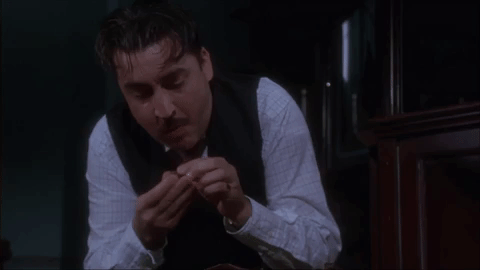| A divinely decadent comedy |
The story begins with infectiously irreverent single mother Vianne (Juliette Binoche) arriving in a conservative French circa the late 1950's. The arrival of vivacious Vianne and her eccentric young daughter causes a stir in the staid town that threatens to erupt into scandal when she opens a chocolaterie in the midst of Lent. Despite the disapproval of the local church and the town's stodgy mayor, Comte de Reynaud (Alfred Molina), the shop begins drawing customers to its decadent wares and away from their Lenten vows. As time passes the town, is divided between the shop's free-thinking customers and its critics, with Vianne forced into a battle of wills with Reynaud. The ensuing conflict between chateau and chocolaterie reaches its breaking point with a final showdown on Easter morning that will decide the future of Vianne, her shop, and ultimately the town.
Beneath its whimsy Chocolat relates an inspiring tale with an emotional core that is never saccharine. Though its portrayal of the often comical conflict between Vianne and Reynaud the film offers a message of tolerance that proves surprisingly resonant at the film's conclusion. The script further reinforces its message through its depiction of the ways in which the townsfolk alienate Vianne, misunderstood battered wife Josephine, and Irish Traveler Roux. By showing the by turns subtle and blatant ways in which these diverse individuals face the same struggle for acceptance the script makes an apt case for tolerance, reminding us that looking, thinking, and behaving differently from us doesn't make someone wrong, it just makes them different from us. Through its endearing portrayals of outsiders Vianne and Roux and local eccentrics Josephine and Armande the film also highlights the importance of remaining true to ourselves and embracing all that makes us unique. While these same messages have been seen in countless films Chocolat's gentle approach and humor ensure that its familiar lessons remains as light and tempting as a fresh piece of chocolate.
The endearingly offbeat tale is brought to vibrant life with a charm that is nothing short of magic thanks to the work of its stellar cast. Judi Dench is a delight in her colorful turn as aging bohemian Armande. Lena Olin is endlessly engaging as she portrays Josephine's journey from vulnerable victim to resilient survivor. Johnny Depp exudes cool in his role as cynical Roux. Alfred Molina nearly steals the film in his uproarious turn as the riotously ridiculous Reynaud. Juliette Binoche carries the film with a charm reminiscent of Audrey Hepburn in her role as Vianne.
A modern fairy tale with the moral merit of a classic fable, Chocolat is good to its last drop. Through its witty script, endearing characters, and inspiring performances, the film is every bit as delightful, as the treats of its title. For deliciously good viewing try a taste of Chocolat.
 |
| Who's counting calories?! |


No comments:
Post a Comment